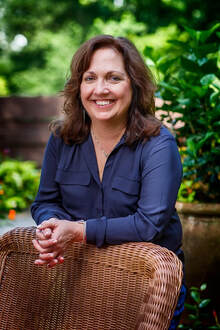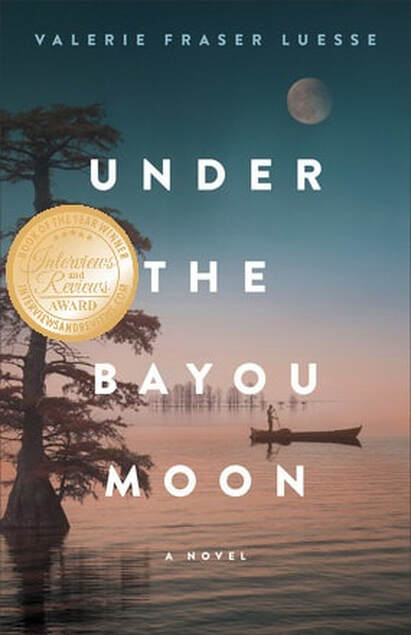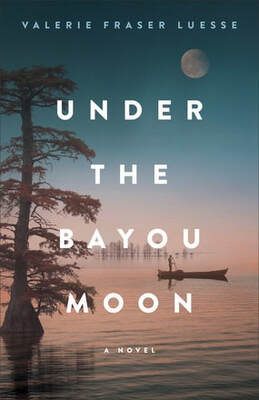 Today, I am pleased to welcome our Book of Year winner, author Valerie Fraser Luesse. Valerie is the bestselling author of Missing Isaac, Almost Home, and The Key to Everything, as well as an award-winning magazine writer best known for her feature stories and essays in Southern Living, where she is currently senior travel editor. Specializing in stories about unique pockets of Southern culture, Luesse received the 2009 Writer of the Year award from the Southeast Tourism Society for her editorial section on Hurricane Katrina recovery in Mississippi and Louisiana. A graduate of Auburn University and Baylor University, she lives in Birmingham, Alabama, with her husband, Dave. Today, we are going to discuss her book Under the Bayou Moon (our Book of the Year Winner). And as a special treat, I & R is giving away two print copies of this incredible book. One in the States and one in Canada! Valerie, welcome to Interviews & Reviews!  Can you give us a brief description of Under the Bayou moon? Ellie Fields is an idealistic but unfulfilled Alabama schoolteacher who seizes the opportunity to upend her life and teach at a remote school in a tiny Louisiana bayou town. Ellie’s a seeker, a young woman in search of her purpose. She arrives in Bernadette to find herself in a Cajun community enduring injustice and prejudice. Ellie will find her place in this community—and find her life in Louisiana—primarily through her relationships with three men: Raphe Broussard, a lonely Cajun fisherman raising his orphaned nephew alone; Heywood Thornberry, a charismatic and insightful photographer who, like Ellie, is an outsider in the bayou; and Doc Talbert, the town physician who becomes Ellie’s mentor and guide. The Bayou Teche in southwest Louisiana is the biggest wetland swamp in America. Why did you choose this location for the setting of your book? There’s no other place on earth like southwest Louisiana, and for me personally, the farther south you go and the closer to the Gulf of Mexico you get, the more intriguing it becomes. To be honest, I wanted to set my story on a fictional bayou, but I couldn’t dream up anything as perfect as the Teche in terms of its location and character—a world where the boundaries between land and water are blurred in a fascinating way. The people down there are just incredible. I was very blessed to have the opportunity to write about Cajun culture for Southern Living magazine, and I don’t think I’ve ever seen a stronger sense of community or more willingness to welcome anyone who comes in friendship. It made a lasting impression on my husband and me as we traveled those bayou towns and communities on the Cajun prairie together, and I believed I could create an authentic character who was an outsider like we were, discovering this place with the help of people who had lived there for generations. During the early 1900s, the Cajun people faced some harsh discrimination. Not only were they punished for using their French dialect, but even their religious beliefs were questioned. Can you provide a glimpse of how these issues are covered in your book? One of the saddest things I can think of is being told that your cultural roots are something to be ashamed of. But that’s what happened to Cajun people well into the twentieth century. Cajun children were punished for speaking their unique French dialect in school, a government-mandated rule that Ellie Fields, my protagonist, knows is nonsense. From her first evening with Raphe Broussard, a young, lonely Cajun fisherman, and Remy, the orphaned nephew he is raising, Ellie gets an inside look at the effects of cultural isolation, which is very different from geographic isolation. By the late 1940s and early 1950s, when my book is set, Cajun people could freely travel from the bayou to the world outside, so it wasn’t the landscape that separated them from the rest of Louisiana and the South. It was their French culture—something their government actively worked to stamp out. Ellie’s first order of business is to let her students know that they should be proud of where they came from. She works just as diligently to learn their native French as to teach them English. In the epilogue, I give readers a glimpse of what came later, after the Balfa Brothers sparked renewed excitement for Cajun music in the 1960s and 1970s and a whole new generation of musicians helped revive the language as they learned traditional songs and wrote new ones in Cajun French. I don’t know that Cajuns in particular were persecuted for their religion, but Southern Catholics in general were considered idol worshipers by some Protestant evangelicals in the 1940s. I watched a documentary about Protestant missionaries in the Atchafalaya Basin during the 1940s, and it was clear that they didn’t recognize Catholics as Christians. As a Southern Baptist with a Catholic husband, I found that intriguing, and I’ve witnessed remnants of prejudice against Catholics myself. Louisiana is a rarity in the Deep South in that its culture is heavily influenced by Catholicism, whereas Christians in the rest of the Deep South, except for some areas on the Gulf Coast, are mostly Protestant. Those two very different expressions of the Christian faith come into play as Ellie and Remy talk about religion as our personal language for worship and communion with God. Your male protagonist, Raphe, is a Cajun fisherman. What type of research was required to accurately portray his profession? Raphe is a fisherman, but not for much longer. His story is not so much about being a fisherman as it is about the realization that he can’t support a family doing what his people have traditionally done to sustain themselves. His father has taught him to be a skilled mechanic, and it’s Raphe’s junkets to a larger town to repair and service the big shrimp boats that allow him to provide for his nephew. So my research was more about how the outside world, with its promises of prosperity, began encroaching on the traditional bayou life. A legendary white alligator plays a key role in Under the Bayou Moon. Please provide a hint of how this elusive alligator impacted the town. I can’t remember how I stumbled onto an internet article about the leucistic alligator—which is extremely rare and mostly white, with brilliant sapphire eyes—but I knew I wanted to make it part of a Louisiana story. Enter Moby Dick, Melville’s dauntingly thick novel I dreaded reading for graduate school! To my surprise, I loved that book. Decades later, when I first saw the white alligator, I started to think about a swamp version of a man’s relationship to an unknowable creature. What do you hope readers will learn or experience when they read Under the Bayou Moon? I wrote this book primarily in 2020, the most difficult year many of us have ever experienced. I had a lot on my mind—namely, our need for community, which I believe is God given; the destructive powers of divisiveness and prejudice; and, conversely, the healing power of nature. You have often been praised for your descriptive writing. How do you think your background as an award-winning magazine writer has added to the cinematic qualities of your book? That’s a wonderful compliment, which I truly appreciate. A delightful, dry-witted Texas writer named Les Thomas used to offer this travel-writing advice to the young guns at Southern Living: “Make ’em laugh, make ’em cry, tell ’em where it is.” Inexperienced writers, he knew, could get so caught up in their own words that they would forget the practicalities of a story. I never forgot that. Gary Ford was another Southern Living writer who gave me example after example of ways to make a place come alive. My closest mentor at Southern Living, Dianne Young, had a vocabulary the size of an ocean liner, and I tried to absorb as much of her descriptive powers as I could, though I was never a match for her. I’m very blessed to have spent my formative years as a magazine writer in the shadow of some of the best. They taught me to help the reader see a place, to feel it in their bones, not just read about it. I work hard to give my novels that same sense of authenticity. It shows. What are you working on next? That’s what I’m trying to figure out! I’ve thought about a nonfiction project based on my blog, Goin’ Down to Mama’s. I have a sequel to my first novel, Missing Isaac, mapped out in my head. I’d love to write a story set on the Outer Banks. And I have several family stories I’d like to explore, such as the year my maternal grandmother spent at an Alabama resort with “healing springs” when she was just sixteen. I’ll be talking with my editor at Revell Books to see what she thinks and go from there. How can readers connect with you? My website, valeriefraserluesse.com, has a subscription button for my newsletter, which comes out monthly. I have two Facebook pages, and readers are welcome on either: @valeriefraserluesse or @valeriefraserluessebooks. Follow me on BookBub @valeriefraserluesse Thank you Valerie! And now Dear Readers, if you live in the States or in Canada and would like to win a copy of Under the Bayou Moon, just fill out the form below! This giveaway ends February 14, 2022. Winners will be notified here, on Facebook and through email. Failure to claim your giveaway within five days will result in another winner being chosen. Congratulations to Nikita Wells and Paula Hess! You have both won a copy of Under the Bayou Moon. Watch for our email! When Ellie Fields accepts a teaching job in a tiny Louisiana town deep in bayou country in 1949, she knows her life will change--but she could never imagine just how dramatically. Though rightfully suspicious of outsiders, who have threatened both their language and their unique culture, most of the residents come to appreciate the young and idealistic schoolteacher, and she's soon teaching just about everyone, despite opposition from both the school board and a politician with ulterior motives. Yet it's the lessons Ellie herself will learn--from new friends, a captivating Cajun fisherman, and even a legendary white alligator haunting the bayou--that will make all the difference. Take a step away from the familiar and enter the shadowy waters of bayou country for a story of risk, resilience, and romance.
Winnie Thomas
2/7/2022 02:54:16 pm
Thanks for the wonderful interview, Laura and Valerie! I enjoyed learning more about this book. I've heard so many great things about it, and I already have a copy in my TBR pile. I'm hoping to get to it soon!
Reply
Leave a Reply. |
�
Categories
All
Archives
July 2024
|


 RSS Feed
RSS Feed
2/7/2022
1 Comment